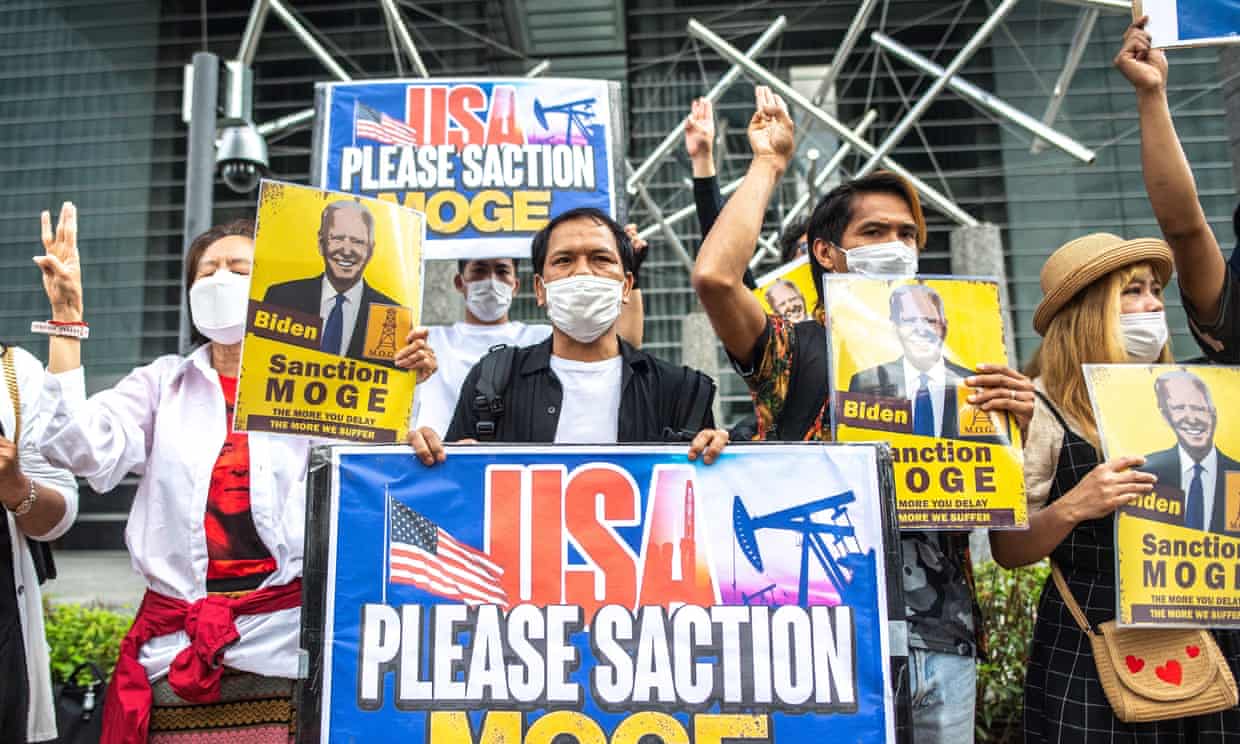On Tuesday, the US issued targeted sanctions against Myanma Oil and Gas Enterprise (MOGE), a significant step that represents concrete action against the state-owned company. Although full-blocking sanctions are not being imposed, this decision has significant ramifications for Myanmar’s ruling junta, which primarily depends on the oil and gas industry for foreign exchange revenue.
Scope of the Sanctions
A series of sanctions announced by the U.S. Treasury Department will limit certain financial services provided by Americans to MOGE. The junta’s operations and violations of human rights are the reason for these sanctions, which are scheduled to go into force on December 15. According to Treasury guidelines, financial services such as insurance, investments, accounts, loans, and other associated transactions will be impacted by these policies.
An important source of foreign exchange earnings for the Myanmar regime has been the oil and gas sector. According to the junta’s most recent data, this industry alone generated an astounding $1.72 billion in revenue in the six months before March 31, 2022. Moreover, MOGE oversees the nation’s oil and gas resources and serves as its main gatekeeper.
Growing Concerns about Human Rights
The Assistance Association for Political Prisoners reports that since the military coup in February 2021, 25,363 people have been jailed and over 4,162 people have been killed by the junta and pro-military parties. In an alarming evaluation, the UN special rapporteur on Myanmar said that the government is “committing war crimes and crimes against humanity on a daily basis.” The international community has been observing these events with considerable attention.

Although MOGE is not on the Specially Designated Nationals (SDN) list, the decision to impose sanctions on it is an important move in the right direction. Human rights groups have been pushing for direct action against MOGE for years, both inside and outside of Myanmar. While not going as far as more severe action, this is the first time Washington has taken a direct shot at a state-owned company, which fulfills a significant request from human rights groups.
Combined Efforts with Foreign Allies
The United States government announced a coordinated strategy with Canada and the United Kingdom to synchronize their respective sanctions regimes in accordance with the MOGE sanctions. The intention is to limit the military leadership in Myanmar’s access to weapons and supplies required for violent acts by applying collective pressure to it. Under Secretary of the Treasury for Terrorism and Financial Intelligence, Brian E. Nelson, stressed the significance of this cooperative effort in a statement released by the Treasury Department.
The U.S. Treasury Department placed sanctions on three entities and five people with connections to Myanmar’s military in addition to MOGE. This measure was coordinated with similar actions taken by the United Kingdom and Canada. The UK targeted five people and one entity that supplied financial services to the regime and supplied restricted goods, such as aviation components. In the meantime, Canada sanctioned 22 entities and 39 people for backing the military regime in Myanmar. Interestingly, neither of these two countries’ announcements referenced MOGE.
Responding to Myanmar’s Continuing Crisis
The Western governments have been imposing sanctions on Myanmar’s military rule for some time now, and these restrictions are the latest. On February 1, 2021, the democratic government headed by Aung San Suu Kyi was overthrown by the military. Widespread nonviolent protests following the coup were met with lethal force, which sparked armed resistance in several parts of Myanmar that some refer to as a civil war.
Ultimately, the implementation of targeted sanctions against MOGE and the coordination of sanctions with other nations highlight the increasing global commitment to tackling the current situation in Myanmar and exerting pressure on the military regime. The sanctions represent another step in the direction of finding a solution to the country’s ongoing crisis, which continues to garner interest and concerns from around the world.



